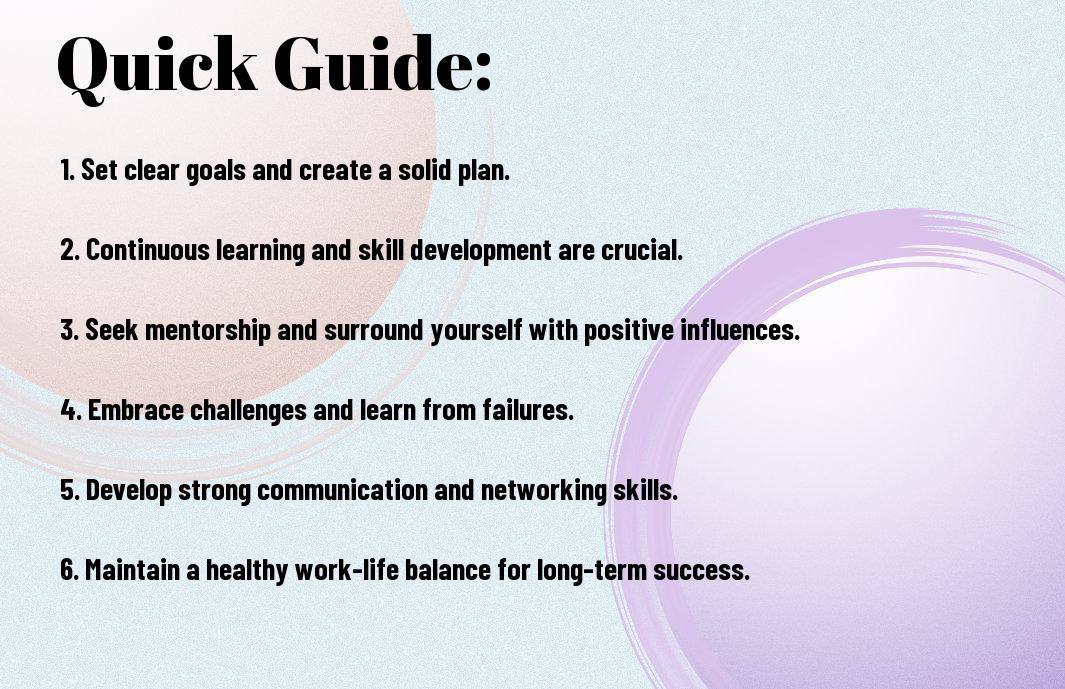
Newsletter Subscribe
Enter your email address below and subscribe to our newsletter

Enter your email address below and subscribe to our newsletter

Just stepping into the professional realm can feel like entering a labyrinth with no clear path to success. In this comprehensive guide, we will uncover the vital keys to not just surviving but thriving in your career. From setting ambitious goals to mastering vital skills, we will explore the critical elements that pave the way to a fulfilling and successful career.


There’s no one-size-fits-all definition of success. It can mean different things to different people, and understanding the various types of success is crucial in your career journey. By recognizing and embracing the diversity in definitions, you can align your goals and actions to what truly matters to you.
| Traditional Definitions | Personal Definitions |
| Typically focus on financial achievements and career advancement. | Emphasize fulfillment, work-life balance, and personal growth. |
| May lead to external validation and societal standards. | Are unique to individuals and prioritize happiness and well-being. |
| Can create pressure and competition in the pursuit of success. | Allow for individuality and self-defined goals. |
| Often measured by promotions, salary, and status. | Measured by personal satisfaction, relationships, and overall happiness. |
| May result in burnout and unfulfilled ambitions. | Lead to a more balanced and meaningful life. |
Some individuals adhere to traditional definitions of success, equating it with external markers like salary, job title, and material possessions. Meanwhile, others find personal definitions of success in intrinsic rewards, such as personal growth, fulfillment, and work-life balance. Understanding these distinctions is vital in shaping your career goals and ensuring they align with your values and aspirations.
Even though success can be measured in various ways, it typically falls into two categories: qualitative and quantitative factors. Qualitative measures include subjective aspects like personal fulfillment, job satisfaction, and work-life balance. On the other hand, quantitative factors involve tangible metrics such as salary increases, promotions, and professional accolades. Balancing these aspects is key to achieving a well-rounded and fulfilling career.
Understanding the diverse nature of success and the various ways to measure it is crucial for your career growth. By acknowledging the importance of both qualitative and quantitative factors, you can strive for a balanced and fulfilling professional life. Recall, success is a personal journey, and defining it on your own terms is the ultimate key to thriving in your career.
Any individual can redefine success based on their unique values and priorities, shaping a career path that brings them true fulfillment. For further guidance on navigating your way to success, check out Advance: The Ultimate How-to Guide for Your Career.
Not everyone who commences on the journey to career success is adequately prepared for the challenges ahead. Before you set foot on the path to your dream career, it’s crucial to take the time to assess yourself and set clear goals. This self-reflection is the foundation upon which you will build your future success.
Self-Assessment is a critical step in understanding what you bring to the table. Take stock of your strengths and weaknesses objectively. Your strengths are the skills and traits that set you apart and make you valuable to employers. On the other hand, your weaknesses are areas where you may need to improve or seek support. By acknowledging both your strengths and weaknesses, you can create a roadmap for personal and professional growth.
Clearly defining your career goals is crucial for staying focused and motivated on your journey. Your goals should be specific, measurable, attainable, relevant, and time-bound (SMART). When setting your career goals, consider what success looks like to you and break down your aspirations into smaller, actionable steps. This will help you track your progress and make adjustments as needed to stay on course.
To ensure you stay committed to your goals, regularly review and update them as you progress in your career. Reflect on your achievements and challenges, and adjust your goals accordingly. Recall, flexibility is key in adapting to changing circumstances and opportunities that may arise along the way. Keep your sights set on your ultimate career destination while remaining open to new possibilities that align with your evolving ambitions.
Despite the challenges that may come your way, building a successful career is possible with the right strategies and mindset. It takes dedication, effort, and a clear roadmap to achieve your professional goals. Here is a step-by-step guide to help you navigate the path to success in your career.
| Educational and Training Milestones | Networking and Relationship Building |
MilestonesEducation and training are fundamental milestones in building a successful career. Pursuing relevant degrees, certifications, and skill-building courses can enhance your knowledge and expertise in your field. |
BuildNetworking and building relationships with professionals in your industry play a vital role in career advancement. Attend industry events, conferences, and connect with peers and mentors to expand your network. |
The planning and development stages of your career are crucial for setting goals, identifying opportunities, and mapping out your professional trajectory. Assess your skills, interests, and values to align your career path with your aspirations.
Now, more than ever, continual learning and adaptability are necessary in navigating the ever-evolving job market. Stay updated on industry trends, technologies, and developments to remain competitive and seize new opportunities.
Achieving success in your career requires a combination of education, networking, strategic planning, and a commitment to lifelong learning. By following these steps and staying proactive in your professional growth, you can build a fulfilling and prosperous career.

Your journey to success in your career is a continuous process that requires dedication and perseverance. To ensure sustainable growth in your professional life, it is crucial to implement strategies that will help you thrive in the long run. Here are some imperative tips to consider:
These imperative tips serve as pillars for sustainable growth in your career. Recall, success is a journey, not a destination. Embrace continuous learning and growth to reach your full potential. 21 Tips To Help You Find Success in a Career.
An effective time management strategy can significantly impact your productivity and efficiency in the workplace. By prioritizing tasks, creating a schedule, and leveraging tools such as task management apps, you can optimize your workday and achieve more in less time. To learn additional time management tips, visit the article 21 Tips To Help You Find Success in a Career.
Balancing work and personal life is crucial for overall well-being and sustained success. It involves setting boundaries, prioritizing self-care, and making time for activities that bring you joy and relaxation. By achieving harmony between your professional and personal commitments, you can enhance your productivity, creativity, and overall happiness.
On the path to success, mentors and coaches play a vital role in providing guidance, support, and valuable insights. They can offer a different perspective, share their experiences, and help you navigate challenges more effectively. By seeking mentorship and coaching, you can accelerate your growth, expand your network, and unlock new opportunities in your career.
Many factors can impact an individual’s career trajectory and level of success. Understanding these influencers can help professionals navigate their paths more effectively. Here are some key factors that can make a difference in one’s career:
For individuals aiming for success in their careers, staying up-to-date with industry-specific trends and challenges is important. Whether it is through continuous education, attending conferences, or networking with industry leaders, keeping a finger on the pulse of what is happening in your field can give you a competitive edge. It is vital to adapt and evolve with the industry to thrive in a rapidly changing environment.
With a strong personal brand and a solid reputation, professionals can differentiate themselves from the competition and attract new opportunities. Building a personal brand involves showcasing your expertise, strengths, and unique value proposition. Your reputation, on the other hand, is how others perceive you based on your actions, behavior, and relationships. Together, they can significantly influence your career trajectory and open doors to advancement.
Factors that contribute to personal brand and reputation include consistent delivery of high-quality work, effective communication skills, strong networking abilities, and a positive online presence. By proactively managing these elements, professionals can enhance their credibility and visibility within their industry, ultimately positioning themselves for greater success and opportunities.
Influence in the workplace today is often determined by one’s ability to embrace innovation and change. Professionals who are adaptable, open to learning, and willing to take risks are more likely to thrive in dynamic and competitive environments. Staying current in your field requires a commitment to ongoing education, a willingness to step out of your comfort zone, and a proactive approach to embracing new technologies and ways of working.
By demonstrating a growth mindset and a willingness to evolve with the times, professionals can position themselves as valuable assets to their organizations and stand out as leaders in their fields. Embracing innovation and change is not just about keeping up; it’s about proactively shaping the future of your career and industry.
| Corporate Careers | Entrepreneurship |
| Stable income | Opportunity for unlimited growth |
| Benefits package | Ability to control your destiny |
| Structured career path | High level of autonomy |
| Networking opportunities | Potentially higher financial rewards |
| Office politics | High level of risk |
Assuming you choose a corporate career path, you will be entering a structured environment with defined roles and responsibilities. Advancement opportunities typically exist, but it may come with the challenge of navigating office politics. There is the potential to hit a glass ceiling, where your advancement may be limited based on factors beyond your control, such as gender or ethnicity.
Ladders Assuming you venture into entrepreneurship, you are embracing the risks and rewards that come with being your boss. The ability to control your destiny and potentially achieve unlimited financial success can be empowering. However, the road to success is filled with uncertainties and challenges, requiring a high tolerance for risk and ambiguity.
This chapter explores the various career paths individuals can take and provides insights into the pros and cons of each. Whether you choose a corporate career, pursue entrepreneurship, or opt for freelancing in the gig economy, understanding the risks and rewards is important for making informed decisions about your professional journey.
Ladders Freelancing and participating in the gig economy offer unparalleled flexibility in terms of work hours and projects. This freedom allows individuals to choose the type of work they want to take on and create a schedule that fits their lifestyle. However, this flexibility often comes at the cost of stability, as income can fluctuate based on the availability of projects and clients.
Careers are diverse and offer a range of opportunities for individuals to pursue their professional goals. Understanding the pros and cons of various career paths is crucial in determining the best fit for your skills, ambitions, and lifestyle. By weighing the risks and rewards of corporate careers, entrepreneurship, and freelancing, you can make informed decisions that align with your long-term success and fulfillment.

For those striving for success in their careers, setbacks and obstacles are inevitable challenges that must be faced head-on. These trying times can test one’s determination and resilience, but they are also valuable opportunities for growth and learning. In my book, The Best Guide to Success: How to Get Ahead in Your Career, I research into the strategies and mindset needed to overcome these hurdles and emerge stronger on the other side.
The ability to handle failure and criticism is crucial for success. Failure is not the end but a stepping stone to success. It provides valuable feedback and insight into areas that require improvement. Instead of letting failure discourage you, use it as motivation to work harder and smarter. Similarly, criticism should be viewed as constructive feedback that can help you refine your skills and approach. Embrace criticism as an opportunity to grow and evolve, rather than as a personal attack.
If you find yourself feeling demotivated or disheartened by setbacks, it’s necessary to reignite your passion and drive. Remind yourself of your goals and the reasons why you initiateed on this journey. Surround yourself with supportive and inspiring individuals who can lift you up during tough times. Additionally, practicing self-care and mindfulness can help you maintain resilience in the face of challenges. Take breaks when needed, prioritize your well-being, and stay positive and focused on your long-term objectives.
Another effective strategy to rekindle motivation is to break down your goals into smaller, more manageable tasks. This can help prevent overwhelm and boost your confidence as you achieve each milestone. By celebrating small wins along the way, you can stay motivated and driven towards your ultimate success.
With this in mind, it is clear that success in one’s career is a multifaceted journey that requires a combination of hard work, determination, resilience, and continuous learning. By setting clear goals, developing a growth mindset, seeking mentorship, and staying adaptable in an ever-changing environment, individuals can truly thrive in their chosen professions. It is crucial to remember that success is not just about reaching a destination but also about enjoying the journey and staying true to one’s values and passions.
Summing up, the ultimate guide to success in your career involves a holistic approach that encompasses personal development, networking, skill-building, and a positive attitude. By mastering these key elements and being open to new opportunities and challenges, individuals can carve out a fulfilling and successful career path for themselves. Be mindful of, success is not a destination but a continuous pursuit of growth and excellence in all aspects of your professional life.
A: Success in a career is important as it brings fulfillment, growth, financial stability, and opportunities for advancement.
A: Success in a career can be defined by achieving personal and professional goals, continuous learning, and making a positive impact in your field.
A: The key elements for success in a career include hard work, determination, resilience, adaptability, continuous improvement, and networking.
A: To thrive in your career, you need to set clear goals, take calculated risks, seek feedback, invest in your skills, and maintain a positive attitude.
A: Continuous learning is crucial for career success as it helps you stay relevant, adapt to changes, and improve your skills to excel in your field.
A: Networking is important for career growth as it helps in building professional relationships, exploring new opportunities, and gaining valuable insights from others.
A: Common obstacles to career success include lack of direction, fear of failure, limited mindset, procrastination, and resistance to change.